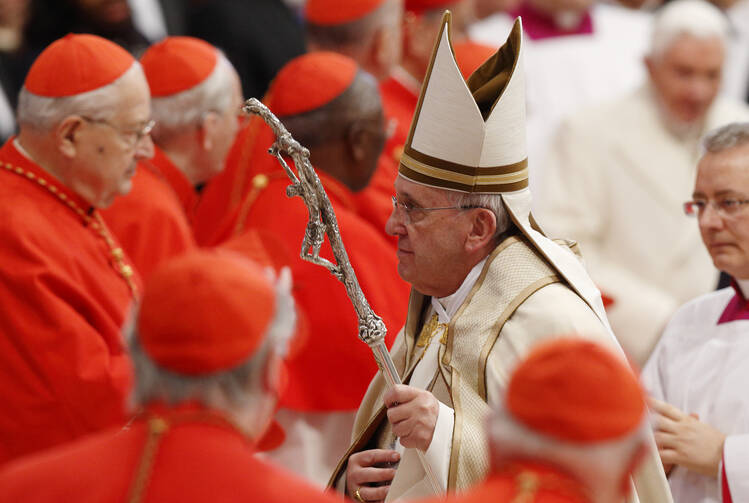Pope Francis created 20 new cardinals from 17 countries in St Peter’s Basilica on Feb. 14 in the presence of his predecessor Benedict XVI. Being a cardinal is “an honor” but “not a kind of accessory, a decoration, like an honorary title,” he told them. As cardinals, he said, they are "incardinated" into the Church of Rome which “presides in charity” over the other churches, and so they themselves must be examples of charity and avoid all uncharitable behavior.
He spelled out in very clear terms what being examples of charity means and warned them about the temptations and sins against charity. He did so before giving each of them a red biretta and ring and the title to a church in Rome.
As he spoke, he could see seated in front of him Benedict XVI—whom he embraced at the beginning and end of the ceremony—and some 160 cardinals from all continents and dignitaries from the homelands of the new cardinals. Among them were the Queen of Tonga, the President of Panama, the Vice Prime Ministers of Spain and Portugal, Government Ministers from Argentina, France and Italy, and the Ambassadors of Myanmar and Uruguay. Also in the congregation of some 8,000 people, were the relatives and friends of the new cardinals, including a Buddhist monk and more than 400 Catholics from Myanmar (280 from inside the country). Many too came from Tonga, Cape Verde, New Zealand, Vietnam, Thailand and other countries, and at least 2,000 Italians.
The pope, as usual, spoke standing behind a lectern in front of the main altar in St Peter’s Basilica. He delivered what could be described as a code of Christian conduct for the cardinals, new and old. He took his inspiration for this from St Paul’s famous “hymn to charity” which is to be found in his First Letter to the Corinthians.
Pope Francis began by telling the new cardinals that they must first be “patient” and “kind." He explained that “patience” means “being able to love without limits, but also to be faithful in particular situations and with practical gestures”; it means “loving what is great without neglecting what is small; loving the little things within the horizon of the great things.” And “kindness” means “the firm and persevering intention to always will the good of others, even those unfriendly to us.”
He told the new cardinals and the 207 other members of the College of Cardinals (60 could not be present for health reasons) that, according to St Paul, charity "is not jealous or boastful, it is not puffed up with pride." As human beings, Francis said, “all of us, at every stage of our lives—are inclined to jealousy and pride,” and church dignitaries are not immune from this temptation. So they should let divine love transform their lives
Furthermore, he said, charity "is not arrogant or rude, it does not insist on its own way." An arrogant and rude person is not living a life of charity, the pope said; he is “self-centered,” seeks his own interests—“often cloaked in noble appearances”—and “inevitably becomes disrespectful.” On the other hand, "respect" is precisely the ability to acknowledge others, to acknowledge their dignity, their condition and their needs. Charity makes us “set ourselves in the real center, which is Christ alone,” not ourselves. “Then, and only then, can we be persons who are respectful and attentive to the good of others.”
As the cardinals watched and listened wondering what was coming next, Francis reminded them that charity "is not irritable, it is not resentful," as St Paul tells us. He acknowledged that “pastors close to their people have plenty of opportunities to be irritable, to feel anger” and risk being even more irritable “in relationships with our confreres.” Only charity can free us from all this, he said. “It frees us from the risk of reacting impulsively, of saying or doing the wrong thing; above all it frees us from the mortal danger of pent-up anger, of that smoldering anger which makes us brood over wrongs we have received.” Looking at the cardinals, Francis told them frankly that such behavior “is unacceptable in a man of the church. Even if a momentary outburst is forgivable, this is not the case with rancor. God save us from that!”
He went onto insist that charity "does not rejoice at the wrong, but rejoices in the right," and told the cardinals, new and old, that “those called to the service of governance in the church need to have a strong sense of justice, so that any form of injustice becomes unacceptable, even those which might bring gain to himself or to the church.” At the same time they must "rejoice in the right." He prayed that people would always see in cardinals “a firm condemnation of injustice and joyful service to the truth.”
He concluded by reminding them that "love bears all things, believes all things, hopes all things, endures all things," and said that in these four words they can find “a spiritual and pastoral program of life.”
After the homily, the pope gave the insignia of office to 19 new cardinals, and then embraced each one. They in turn embraced the other cardinals present. The elderly new cardinal from Colombia could not be present for reasons of health, he will be 96 years old on February 18, and will be given the biretta and ring at home.
As a result of this new batch of cardinals, the College of Cardinals now has 227 members from 73 countries and all continents, but only 125 are electors and they are from 59 countries. Pope Francis has now created 39 cardinals in two consistories, of whom 31 are electors. St John Paul II has created 34 of the current electors and Benedict XVI has created 60 of them.








